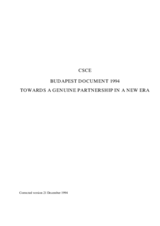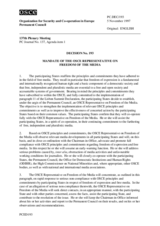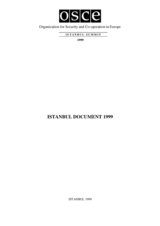-
Our work
-
Fields of work
- Arms control
- Border management
- Combating trafficking in human beings
- Conflict prevention and resolution
- Countering terrorism
- Cyber/ICT Security
- Democratization
- Economic activities
- Education
- Elections
- Environmental activities
- Gender equality
- Good governance
- Human rights
- Media freedom and development
- Migration
- National minority issues
- Policing
- Reform and co-operation in the security sector
- Roma and Sinti
- Rule of law
- Tolerance and non-discrimination
- Youth
- Field operations
- Projects
-
Meetings and conferences
- Summit meetings
- Review Conferences
- Ministerial Council meetings
- Plenary meetings of the Permanent Council
- Plenary Meetings of the Forum for Security Co-operation
- Security Review Conferences
- Annual Implementation Assessment Meetings
- Economic and Environmental Forum
- Economic and Environmental Dimension Implementation Meetings
- Human rights meetings
- Media conferences
- Cyber/ICT security conferences
- Conference of the Alliance against Trafficking in Persons
- Gender equality conferences
- Annual OSCE Mediterranean conferences
- Annual OSCE Asian conferences
- Partnerships
-
Fields of work
-
Countries
- All
-
Participating States
- Albania
- Andorra
- Armenia
- Austria
- Azerbaijan
- Belgium
- Belarus
- Bosnia and Herzegovina
- Bulgaria
- Canada
- Croatia
- Cyprus
- Czechia
- Denmark
- Estonia
- Finland
- France
- Georgia
- Germany
- Greece
- Holy See
- Hungary
- Iceland
- Ireland
- Italy
- Kazakhstan
- Kyrgyzstan
- Latvia
- Liechtenstein
- Lithuania
- Luxembourg
- Malta
- Moldova
- Monaco
- Mongolia
- Montenegro
- The Netherlands
- North Macedonia
- Norway
- Poland
- Portugal
- Romania
- Russian Federation
- San Marino
- Serbia
- Slovakia
- Slovenia
- Spain
- Sweden
- Switzerland – OSCE Chairpersonship 2026
- Tajikistan
- Türkiye
- Turkmenistan
- Ukraine
- United Kingdom
- United States of America
- Uzbekistan
- Asian Partners for Co-operation
- Mediterranean Partners for Co-operation
-
Structures and institutions
- Chairpersonship
-
Secretariat
- Secretary General
- Office of the Secretary General
- Conflict Prevention Centre
- Transnational Threats Department
- Office of the Special Representative and Co-ordinator for Combating Trafficking in Human Beings
- Office of the Co-ordinator of OSCE Economic and Environmental Activities
- Gender Issues Programme
- Opportunities for Youth
- Department of Human Resources
- Department of Management and Finance
- Office of Internal Oversight
- Documentation Centre in Prague
- Institutions
-
Field operations
- Presence in Albania
- Centre in Ashgabat
- Programme Office in Astana
- Programme Office in Bishkek
- Mission to Bosnia and Herzegovina
- Programme Office in Dushanbe
- Mission in Kosovo
- Mission to Moldova
- Mission to Montenegro
- Mission to Serbia
- Mission to Skopje
- Project Co-ordinator in Uzbekistan
- Closed field activities
- Parliamentary Assembly
- Court of Conciliation and Arbitration
- Organizational structure
- About us
Our mandate on media freedom and development
Helsinki Final Act
1 August 1975
During the Cold War, the countries of the Northern Hemisphere recognized the crucial importance of the free flow of information in reducing tensions and maintaining peace and stability. In 1975, they resolved, in the Helsinki Final Act, to act in conformity with the Universal Declaration of Human Rights and, in particular, to co-operate in the field of information and improve access to information and the working conditions of journalists.
Freedom of the Media Commitments
Commitments: Freedom of the Media, Freedom of Expression, Free Flow of Information, 1975-2017 (4th edition)
2 November 2017
Since the Helsinki Final Act, many OSCE decisions, declarations and documents have included provisions that explicitly addressed or touched upon media freedom and freedom of expression issues, from the Charter of Paris for a New Europe (1990) to a ministerial decision on enhancing OSCE efforts to ensure Roma and Sinti sustainable integration (Athens, 2009), or a ministerial declaration on Preventing and Countering Violent Extremism and Radicalization that lead to Terrorism (Belgrade, 2015). A compilation, stretching over more than 40 years of OSCE history, gives an overview of the Organization’s commitments on the issue of freedom of the media and expression.
Copenhagen Meeting Document
Document of the Copenhagen Meeting of the Conference on the Human Dimension of the CSCECSCE
Conference on Security and Co-operation in Europe
29 June 1990
In 1990, the participating States reaffirmed in the Copenhagen Meeting Document that “everyone will have the right to freedom of expression including the right to communication. This right will include freedom to hold opinions and to receive and impart information and ideas without interference by public authority and regardless of frontiers.”
Charter of Paris for a New Europe
21 November 1990
In the same year, the States explicitly affirmed in the foundational Charter of Paris that “without discrimination, every individual has the right to […] freedom of thought, conscience and religion or belief, […] freedom of expression, [and] freedom of association and peaceful assembly”.
Towards a Genuine Partnership in a New Era
6 December 1994
Another milestone was reached in 1994 when the Heads of State or Government reaffirmed in the Budapest Document, Towards a Genuine Partnership in a New Era, “that freedom of expression is a fundamental human right and a basic component of a democratic society. In this respect, independent and pluralistic media are essential to a free and open society and accountable systems of government.”
Permanent Council Decision No. 193
5 November 1997
Istanbul Document
19 November 1999
In the Istanbul Summit Declaration in 1999, the States returned to the issue of freedom of the media and of expression, committing themselves to “ensuring the freedom of the media as a basic condition for pluralistic and democratic societies”. Concerned about the exploitation of media in areas of conflict to foment hatred and ethnic tension and the use of legal restrictions and harassment to deprive citizens of free media, they underlined “the need to secure freedom of expression, which is an essential element of political discourse in any democracy.”






